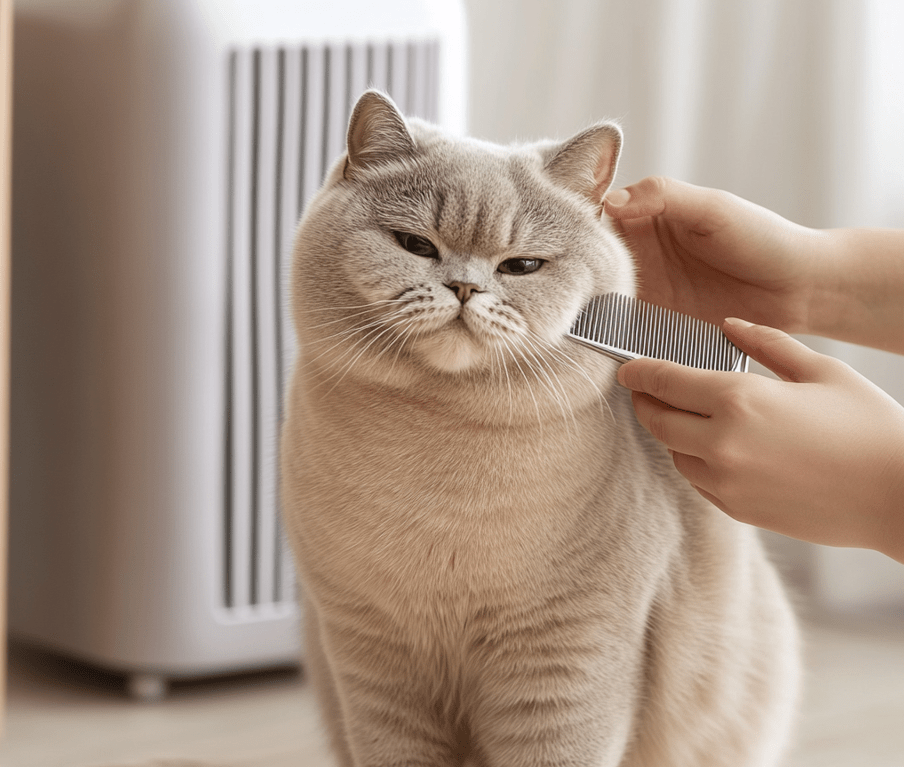
Are you allergy prone and wanting a new pet? If yes, you may be surprised to discover that not all cats are hypoallergenic, regardless of the length of their fur. The British Shorthair hypoallergenic traits make this breed an excellent choice for individuals seeking a low-allergy cat companion.
While they do not produce as much of a protein known to cause allergies — called Fel D1 — than other cats, it is still present in their saliva, dander and urine. It’s also worth acknowledging that some individuals may be exposed to these allergens and show not a single sign of a reaction!
The short answer is that British Shorthair cats aren’t hypoallergenic, but there are steps you can take to share a happy life with your cat if you have allergies.
To watch the summary of this article, just watch this video-
Why Are Some People Allergic to Cats?

To read why British Shorthair cats aren’t hypoallergenic requires an elementary understanding on how allergies work. Allergies are your immune system reacting to specific protein particles in the air called allergens. These particles can enter the body through inhalation or physical contact and cause symptoms such as sneezing, nasal congestion and coughing. For example, features of hay fever can cause sneezing in response to pollen exposure.
One of the most common myths is that British Shorthair cats are less prone to cause allergies because allergy-causing particles do not become airborne by their shedding. This assumption, however, is not true. The main allergen that causes allergic reactions to cats is not contained in their fur but in a protein present in their saliva.
A cat’s fur gets covered by this protein when they groom themselves. After the fur shedding is complete, the allergenic particles become aerosolized and inhaled into the body to act in an allergic manner. However, British Shorthair cats do not shed allergenic particles in their hair but do express allergens through their saliva. That’s why petting or cuddling them may cause allergy symptoms in people with sensitivities.
What Is a Hypoallergenic Cat?
A hypo-allergenic cat generates less saliva that causes an allergic reaction. This is generally indicated on the cat’s registration papers with a letter “H,” for “hypoallergenic.”
A cat’s coat can affect how allergenic it is, too. For example, cats whose undercoats were wiry (as opposed to soft or dense) shed less dander because the fur doesn’t reach as deeply into the skin when petted. These cats are also more likely to be hypoallergenic.
Short-haired cats are also hypoallergenic, such as Persians. If your allergies are really bad, you might wish to consider one of the following hypoallergenic dogs:
1.Persian
2.Siberian
3.Cornish Rex
4.Russian Blue
5.Bengal
6.Siamese
Allergies and Living with a British Shorthair Cat
If you’re allergic to cats but you’re determined to share your life with a British Shorthair, you can do a few things to keep your symptoms under control and limit the presence of allergens in your home.
Environmental Considerations
In order to reduce any allergens, your British Shorthair should stay inside as much as possible. If going outdoors is essential for your feline friend, please ensure any coat is well-groomed before returning home to try to limit the amount of allergens they bring in.
Use natural, quality litter for the litter box. Cleaning regularly, scooping and frequently changing the litter will help contain allergens from being in your home.
An air purifier can even be helpful. Choose one that has a HEPA filter, which is built to eliminate small particles in the air. The filter should be replaced every one year in order to be effective.

Grooming
Having your cat groomed regularly is crucial for minimizing the allergens in your cat’s fur. Try adopting a British Shorthair kitten, since they generally shed less fur and dander than adults.
Groom your cat with a metal comb and brush every couple of days at least. Gently brush against the way the hair lies, pressing lightly. That removes loose hair as well as dander from the skin. Fur from shedding can be collected with a rubber brush and vacuum cleaner.
For some people, bathing the cat regularly can help limit allergen buildup on their fur and skin, since this helps to wash away any external allergens they may have acquired from the environment.
Medications
Allergy medications sold over-the-counter (OTC) are widely available, suppressing sneezing and a runny nose for up to 24 hours.
If these remedies don’t relieve your symptoms enough, speak with your doctor about Allergen-Specific Immunotherapy (ASIT). This treatment consists of allergy shots aiming to mitigate responses to specific allergens, and the effects can last for as long as three years.
Healthy Habits

Some habits can help you further reduce allergic reactions. Here’s how to make a noticeable difference in allergen exposure:
1.Wash your hands afterward.
2.Avoid sleeping with your cat.
3.Discourage your cat from sitting on furniture where you put your face, such as beds and sofas.
4.Keep your cat indoors to reduce exposure to outdoor allergens.
5.Then vacuum or sweep regularly to get the pet hair and dander out of your home.
Should You Still Consider Getting a British Shorthair?

British Shorthairs are good companions for many, courtesy of their charming personalities and therapeutic qualities. If you indeed have an allergy, there are effective methods like frequent grooming, keeping your home clean and medication to help manage the symptoms. These tips may allow you to live your life with your cat and not suffer from major allergic reactions. Allergies aren’t a reason to write off this breed. There are products available for making life with a British Shorthair possible.




